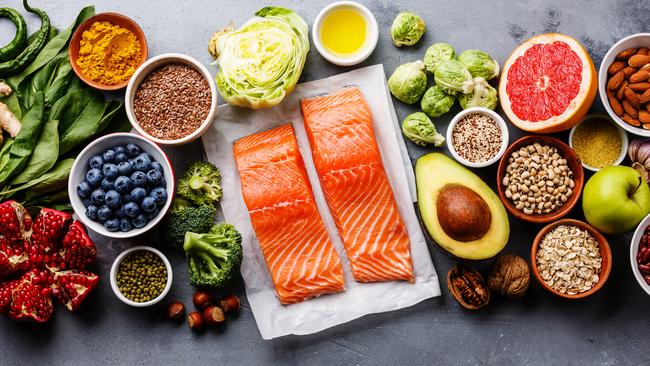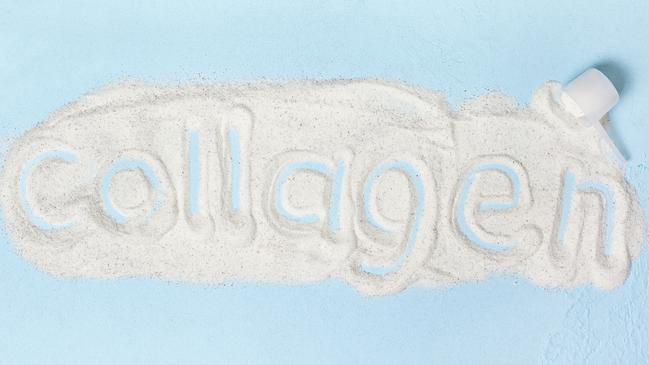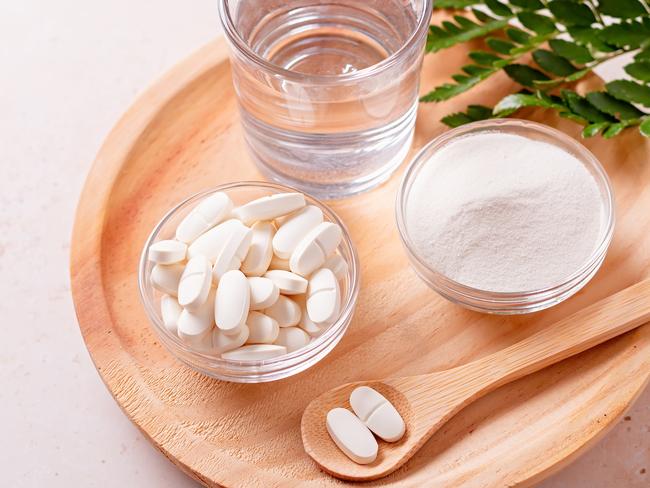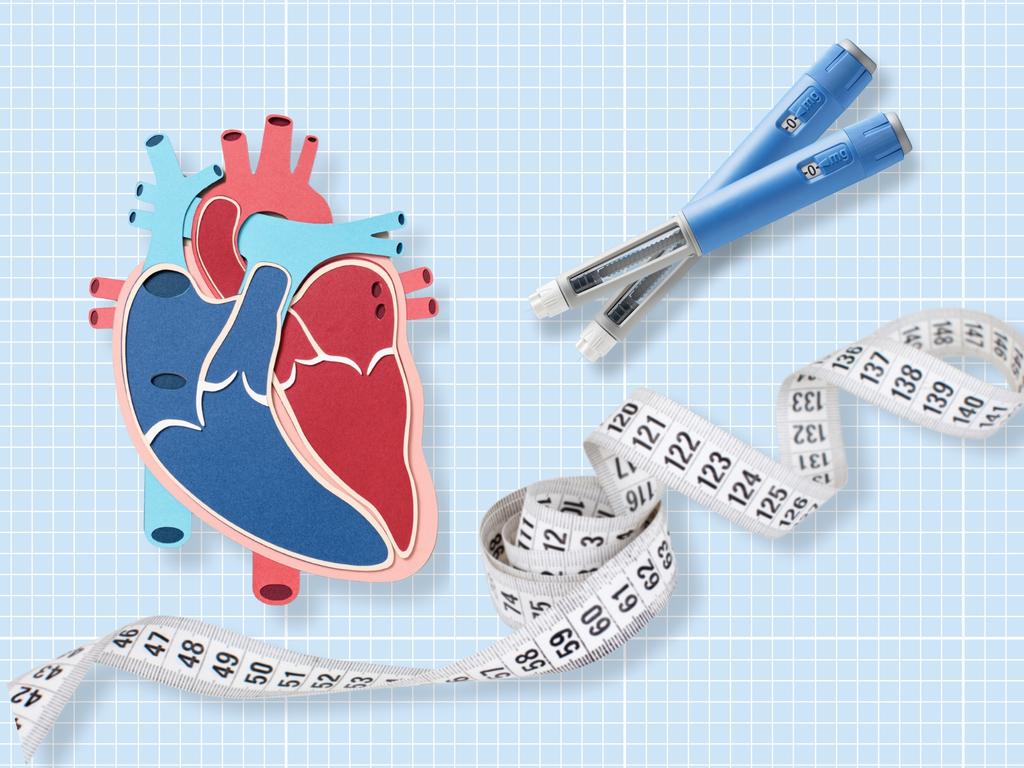Collagen: ‘You can’t be a vegan if you want to get it from your diet’
With hefty promises of more youthful skin and greater wellbeing, are collagen supplements worth the hype or just clever marketing?

They’re the supplements promising to deliver more youthful looking skin and luscious hair and greater wellbeing from just a scoop of (expensive) powder added to your morning beverage.
Their benefits are even touted by some of the world’s most recognisable celebrities including Kate Hudson and Jennifer Aniston, along with countless social media influencers, all with glowing skin. Of course, we’re talking about collagen.
The fine print shows Hudson and Aniston are also tied to companies selling the supplements they’re promoting. They’re not the only ones jumping aboard. Australians are some of the highest users of vitamins and supplements globally, with various estimates suggesting the world collagen market alone is worth more than $US2.5bn ($3.97bn) a year, and growing.
Collagen is credited with everything from improving skin elasticity and hydration, boosting wound healing, helping with joint pain, promoting hair growth and strengthening nails and improving overall wellbeing.
With so much hype, is there truth to what’s being promised? The bad news is that the research is limited. However, some studies do suggest there could be some benefits.
We asked Michelle Wong, a cosmetic chemist and science communicator, and Treasure McGuire, an associate professor of pharmacology at Bond University, to help cut through the hype.


WHAT IS COLLAGEN?
Collagen is a fibre-like structural protein found in connective tissue, skin, tendons, bones and cartilage throughout our bodies. It’s the most abundant protein in the body.
Collagen loss is inevitable as we age because our bodies produce less of it. It’s part of the reason our skin gets thinner, more prone to wrinkles, and takes longer to heal. That loss can be further accelerated by damage from UV exposure, and lifestyle factors including excessive alcohol consumption, smoking, diets high in sugar and processed foods, and a lack of exercise.
Professor Treasure McGuire:
“There are about 28 different types of genetically identifiable collagen. The most common are type one, which is found in our skin, our bones, and our teeth; type two, found in cartilage; and type three in our muscles, skin and blood vessels.
“Probably the other one that may be relevant is type five which is in hair and bone, but also in our liver and our lungs. So, we’ve got a lot of collagen in our body, because it’s simply a structural protein in our tissue.”
Dr Michelle Wong:
“It’s good for your skin’s thickness and balance. Your collagen peaks when you’re about 25 and then goes down from there. When you start getting a bit older, your collagen starts breaking down for a lot of reasons, part of that reason is hormones, so during menopause there’s a dip.
“It’s one of the reasons why you start getting a lot of fine lines and wrinkles as you get older.”
WHAT TO KNOW ABOUT COLLAGEN AND FOOD

A natural way to boost collagen and to stimulate its production is through the foods we eat. As already noted, diets high in sugar and refined carbohydrates can damage collagen.
Dr Wong:
“The main amino acid that matters in collagen is called hydroxyproline and it’s pretty much only found in collagen, which is why collagen is so different from other proteins.
“I see a lot of stuff out there about how it’s just a protein and you can just take any protein and you’ll get the same effect. But that doesn’t seem to be true because of this unique amino acid.
“In terms of eating collagen, it seems like it does have some effects on skin. We don’t know whether that’s linked to boosting collagen levels; that’s not really established. Usually, the studies are looking at things like improved hydration and improved appearance and fine lines.
“Collagen is in a lot of food that we already eat.”
Professor McGuire:
“We get collagen essentially from our diet. If you have a good diet, particularly rich in the natural collagen sources – dairy, eggs or meat – you don’t necessarily need supplementation.
“One of the best sources of collagen is gelatine, it comes from a bovine or other animal source.
“You can’t be a vegan if you want to get enough from your diet because it primarily comes from the broth of meat, fish or chicken. We can get a small amount from plants; from citrus, berries, cashew nuts, that sort of thing, but the amounts are tiny.
“So, when people are taking it as a supplement, they’re actually taking an artificial collagen source that’s been created from, largely, bovine cattle sources, or marine, or poultry.”
COLLAGEN SUPPLEMENTS

Research into collagen supplements is limited in its scope, making it difficult to compare results and to say definitively if, when, and how they work. Another complication is that dosages of supplements are not the same across the board, so comparisons are tough.
Some of the more thorough studies have shown encouraging results for improved skin moisture.
Supplements made in Australia are often marketed as having a Therapeutic Goods Administration listings. But be wary. As a rule, if a product carries a marking of AUST-L, it simply indicates it has been evaluated by the TGA as containing what is stated on the label. The TGA does not test that the product works. Products with the marking of AUST-R are registered medicines that have been shown they do what they say they will. Typically, supplements made in Australia will be listed with the TGA but only have an AUST-L marking.
It is also worth knowing that supplements can interact with other medications and conditions and they can come with harmful side effects, which is why you should seek the advice of a doctor before taking them.
Dr Wong:

“Proteins are basically a whole bunch of amino acids joined together like beads in the necklace. If you break up the beads in the necklace, you get shorter chains of beads. Basically, collagen has a special bead called hydroxyproline and it seems to be able to signal in ways that other amino acids don’t.
“The theory behind how collagen works, which isn’t really that well substantiated but kind of makes sense from a biological point of view, is that when your skin senses that there’s broken down collagen, it will change how it acts.
“Collagen supplements; they are broken down bits of collagen. So, when you take it and it goes into your blood, it tells your skin that there’s broken down collagen and it reacts even though you haven’t damaged your collagen.
“There does seem to be a benefit to collagen supplements that isn’t there from regular food, or there’s more of an effect, anyway. That seems to be because your stomach doesn’t break down the longer strands quite as much as the shorter ones in supplements.
“Fish collagen seems to be the best one for skin. But, I mean, there’s so many questions around collagen research; a lot of it is sponsored by supplement companies and the studies are actually designed around their specific supplement. It could be that the supplement companies are funding the fish collagen research.”

Professor McGuire:
“There have been a couple of systematic reviews of randomised control trials … it’s difficult to compare the results because each study has different primary or secondary outcomes.
“It is important, if you’re going to buy a collagen supplement, that you buy one that is listed with the Therapeutic Goods Administration as a supplement. That doesn’t have anything to do with effectiveness or efficacy; you’re just assured that the product, if it says X number of milligrams, that’s what it contains and they are tested in terms of quality control to remove contaminants.
“If you’re wanting a large pure collagen dose, then I think the powders are probably a better option than tablets, because you’re probably getting closer to a dose that equates to what you might be getting as part of your diet.
“On balance, in someone who is heading towards menopause or post menopausal and taking a dosage of say 5g to 15g of the collagen powder, and you were willing to take it for three to four months … maybe two thirds of patients would notice some improvement in that skin integrity.
“But it’s not a quick fix and the other thing is that it’s not cheap.”
ARE THERE ANY MORE RED FLAGS?
Yes. Both of our experts say heavy metal contamination can be common in collagen supplements and they urge anyone considering purchasing or consuming the products to do their own due diligence into both the supplement and the company making them.
There is also a risk of taking too much, which can be harmful.
Dr Wong:
“A lot of the time people think supplements are natural and are automatically safe, and that’s just not true.
“With supplements, in general, they’re not as regulated as a lot of people think. So, a lot of the time they don’t quite contain the things that people say they contain, and then there’s also a lot of impurities.
“So, it’s probably good to check up on that specific collagen supplement if you can, and if not, then check the brand. Look for independent studies on whether or not there’s heavy metal contamination that’s been found in their other products.
“On top of that, I would also look at what else is in the supplement. A lot of collagen supplements have other supposedly beneficial-for-skin additives, like biotin and vitamin A, and if you have too much of those, that’s also a problem. So biotin, in particular, is in a lot of skin supplements and it interferes with some blood tests. So please check what else is in the supplement!”
Professor McGuire:
“There are cases of contaminated collagen from various animal collagen sources when the products are coming in from overseas and haven’t had that assessment by the TGA.
“So, I guess that’s one thing that we can emphasise from a safety perspective.
“And like any other therapeutic product … dose is very important, because as we increase the dose, we increase the likelihood of effectiveness as well as increasing the likelihood of potential toxicity. The things that have been reported with collagen include skin rashes, acne breakouts, kidney stones have been reported, bloating, diarrhoea, constipation. But these effects are, again, dose related.”
THE FINAL VERDICT

A lot of the studies into the effects of collagen supplements last at least three months, meaning you may need to take them for that long to start to see results. Given the cost of some of the products, that is a lot of time and money to test it out.
If you’re keen to give it a go for its effects on skin and appearance, our experts suggest taking a photo of yourself before you start taking the supplements and compare it to one taken three or four months later.
But also remember, there are some other more basic and less expensive measures you should be doing to protect your skin and overall health.
Professor McGuire:
“Bottom line, we should be promoting a healthy diet with those key animals sources, dairy, or eggs, and getting the protein in this way to try and do what the supplementation is artificially trying to do.
“There isn’t a great vegan alternative for collagen. If you’re willing to use an animal source supplement, in a sufficient dose, there may be some benefit, certainly better than placebo.”
Dr Wong:
“In terms of skin, there’s a lot more evidence for wearing sunscreen, using tretinol, you know, those really boring standard skincare things.
“(Supplements) costs a lot more than using these very basic things. So usually the first thing I say is, if you’re not already doing those, do those first because there’s so much more value for money and there’s also a much better evidence base.”






To join the conversation, please log in. Don't have an account? Register
Join the conversation, you are commenting as Logout